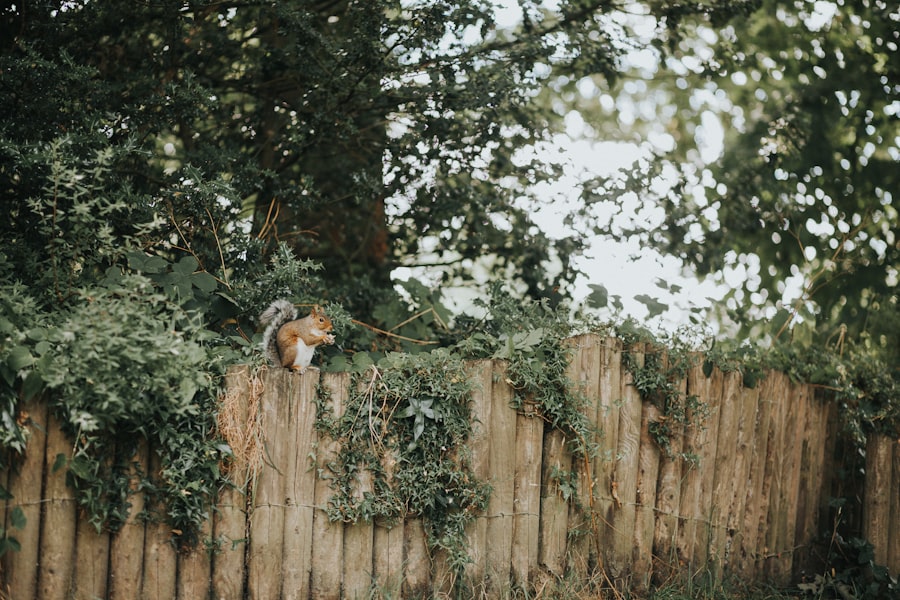Free-range chickens exhibit natural behaviors that can impact gardens and landscaped areas. These birds have an innate drive to forage, searching for insects, seeds, and other food sources. This instinct often leads them to explore gardens and similar environments.
Chickens also possess a strong urge to scratch and peck at the ground, which can potentially damage plants and disturb soil in garden beds. Chickens are social creatures that typically operate as a flock. When one chicken discovers a new area or food source, such as a garden, others are likely to follow.
This collective behavior can make it challenging to prevent chickens from entering gardens, as they may work together to overcome barriers or find alternative entry points. Understanding these natural behaviors and social dynamics is essential for developing effective strategies to keep chickens out of gardens while ensuring their well-being. Gardeners and chicken keepers must consider these factors when implementing deterrent methods or designing garden protection systems.
Table of Contents
- 1 Implementing Physical Barriers to Keep Chickens Out of the Garden
- 2 Using Natural Deterrents to Keep Chickens Away
- 3 Creating Distractions to Redirect Chickens Away from the Garden
- 4 Training Chickens to Avoid the Garden Area
- 5 Consistently Monitoring and Managing Chicken Behavior
- 6 Seeking Professional Help if Necessary
- 7 FAQs
- 7.1 What are free range chickens?
- 7.2 Why do free range chickens go into gardens?
- 7.3 How can I keep free range chickens out of my garden?
- 7.4 What types of fencing can be used to keep chickens out of the garden?
- 7.5 What are some natural repellents to keep chickens out of the garden?
- 7.6 How can I provide alternative foraging areas for free range chickens?
Key Takeaways
- Free range chickens are naturally curious and will explore their surroundings, including gardens.
- Physical barriers such as fences and netting can effectively keep chickens out of the garden area.
- Natural deterrents like citrus peels, coffee grounds, and predator urine can discourage chickens from entering the garden.
- Distractions such as providing a designated foraging area or hanging shiny objects can redirect chickens away from the garden.
- Training chickens with positive reinforcement and consistent redirection can help them learn to avoid the garden.
- Regular monitoring and management of chicken behavior is essential to ensure they stay away from the garden.
- Seeking professional help from a poultry expert or animal behaviorist may be necessary if other methods are ineffective.
Implementing Physical Barriers to Keep Chickens Out of the Garden
Physical Barriers: A Proven Deterrent
One of the most effective ways to keep chickens out of the garden is by implementing physical barriers. This can include installing fencing around the perimeter of the garden, using chicken wire or mesh to cover individual plants, or creating raised beds that are difficult for chickens to access. Fencing should be at least 6 feet tall to prevent chickens from flying over it, and it should be buried at least 6 inches into the ground to prevent chickens from digging underneath it.
Scare Tactics: An Additional Layer of Defense
In addition to fencing, gardeners can also use scare tactics such as motion-activated sprinklers or noise-making devices to deter chickens from entering the garden.
Maintenance is Key to Success
These physical barriers can be highly effective in keeping chickens out of the garden, but they require regular maintenance and monitoring to ensure that they remain intact and functional.
Using Natural Deterrents to Keep Chickens Away

In addition to physical barriers, there are several natural deterrents that can be used to keep chickens out of the garden. One common method is to plant aromatic herbs and flowers that chickens find unappealing, such as lavender, mint, or marigolds. These plants not only add beauty and fragrance to the garden, but they can also help repel chickens with their strong scents.
Another natural deterrent is the use of predator decoys, such as fake owls or hawks, which can create the illusion of danger and discourage chickens from entering the garden. Additionally, spreading mulch or gravel around the perimeter of the garden can make it less inviting for chickens to scratch and peck at the soil. These natural deterrents can be effective in keeping chickens out of the garden while also enhancing the overall aesthetics of the space.
Creating Distractions to Redirect Chickens Away from the Garden
Another strategy for keeping chickens out of the garden is to create distractions that redirect their attention elsewhere. This can include providing alternative foraging areas with plenty of insects and seeds for the chickens to enjoy. By offering a designated space for the chickens to explore and forage, gardeners can help minimize their interest in the garden.
Additionally, hanging treats such as suet or seed blocks in other areas of the yard can help draw chickens away from the garden. By providing enticing distractions, gardeners can help satisfy the natural instincts of free range chickens while protecting their garden from damage.
Training Chickens to Avoid the Garden Area
While it may seem counterintuitive, it is possible to train chickens to avoid certain areas, including the garden. One method is to use positive reinforcement by rewarding chickens with treats when they stay out of the garden. This can help create a positive association with staying away from the garden and encourage them to seek out alternative foraging areas.
Another approach is to use negative reinforcement by creating deterrents such as noise or water sprays when chickens enter the garden. Over time, this can help teach chickens that entering the garden results in an unpleasant experience, leading them to avoid the area altogether.
Consistently Monitoring and Managing Chicken Behavior

Inspect and Maintain Barriers
Regular inspections of physical barriers are necessary to identify any damage or weaknesses that may allow chickens to enter the garden. This includes replenishing natural deterrents such as aromatic plants or predator decoys to keep chickens at bay.
Stay Vigilant and Proactive
By staying vigilant and proactive, gardeners can prevent chickens from gaining access to the garden and minimize any potential damage. This requires a commitment to regularly monitoring the garden and its surroundings to ensure that chickens are kept out.
Observe and Understand Chicken Behavior
Observing chicken behavior and identifying patterns or trends can inform future strategies for keeping them out of the garden. By understanding their habits and tendencies, gardeners can develop targeted approaches that address specific behaviors and minimize their impact on the garden.
Seeking Professional Help if Necessary
In some cases, keeping chickens out of the garden may require professional assistance. This could involve consulting with a poultry expert or animal behaviorist who can provide insights and recommendations based on their expertise. Professional help may also be necessary if there are underlying issues such as overcrowding or inadequate foraging opportunities that are driving chickens to seek out gardens as a food source.
Furthermore, local agricultural extension offices or poultry organizations may offer resources and support for managing free range chickens and addressing challenges related to their behavior. By seeking professional help when needed, gardeners can access specialized knowledge and guidance that can help effectively manage chicken behavior and protect their gardens. In conclusion, understanding the behavior of free range chickens is essential in developing effective strategies for keeping them out of the garden.
By implementing physical barriers, using natural deterrents, creating distractions, training chickens, consistently monitoring behavior, and seeking professional help if necessary, gardeners can minimize the impact of free range chickens on their gardens while promoting a harmonious coexistence with these curious and explorative birds.
If you’re struggling to keep free range chickens out of your garden, you may want to consider building a larger coop for them. According to Poultry Wizard, the size of the coop is an important factor in keeping chickens contained and happy. A larger coop can provide them with more space to roam and explore, reducing the likelihood of them wandering into your garden.
FAQs
What are free range chickens?
Free range chickens are poultry that are allowed to roam freely and forage for food, as opposed to being confined to a coop or small enclosure.
Why do free range chickens go into gardens?
Free range chickens may be attracted to gardens because they offer a variety of plants, insects, and other food sources for the chickens to forage.
How can I keep free range chickens out of my garden?
There are several methods to keep free range chickens out of your garden, including using fencing, creating physical barriers, using repellents, and providing alternative foraging areas.
What types of fencing can be used to keep chickens out of the garden?
Chicken wire, electric fencing, and netting are commonly used to create barriers to keep free range chickens out of gardens.
What are some natural repellents to keep chickens out of the garden?
Natural repellents such as citrus peels, garlic, and hot pepper spray can be used to deter free range chickens from entering the garden.
How can I provide alternative foraging areas for free range chickens?
Creating designated foraging areas with loose soil, mulch, and scattered feed can help redirect the chickens’ natural foraging instincts away from the garden.
Meet Walter, the feathered-friend fanatic of Florida! Nestled in the sunshine state, Walter struts through life with his feathered companions, clucking his way to happiness. With a coop that’s fancier than a five-star hotel, he’s the Don Juan of the chicken world. When he’s not teaching his hens to do the cha-cha, you’ll find him in a heated debate with his prized rooster, Sir Clucks-a-Lot. Walter’s poultry passion is no yolk; he’s the sunny-side-up guy you never knew you needed in your flock of friends!







